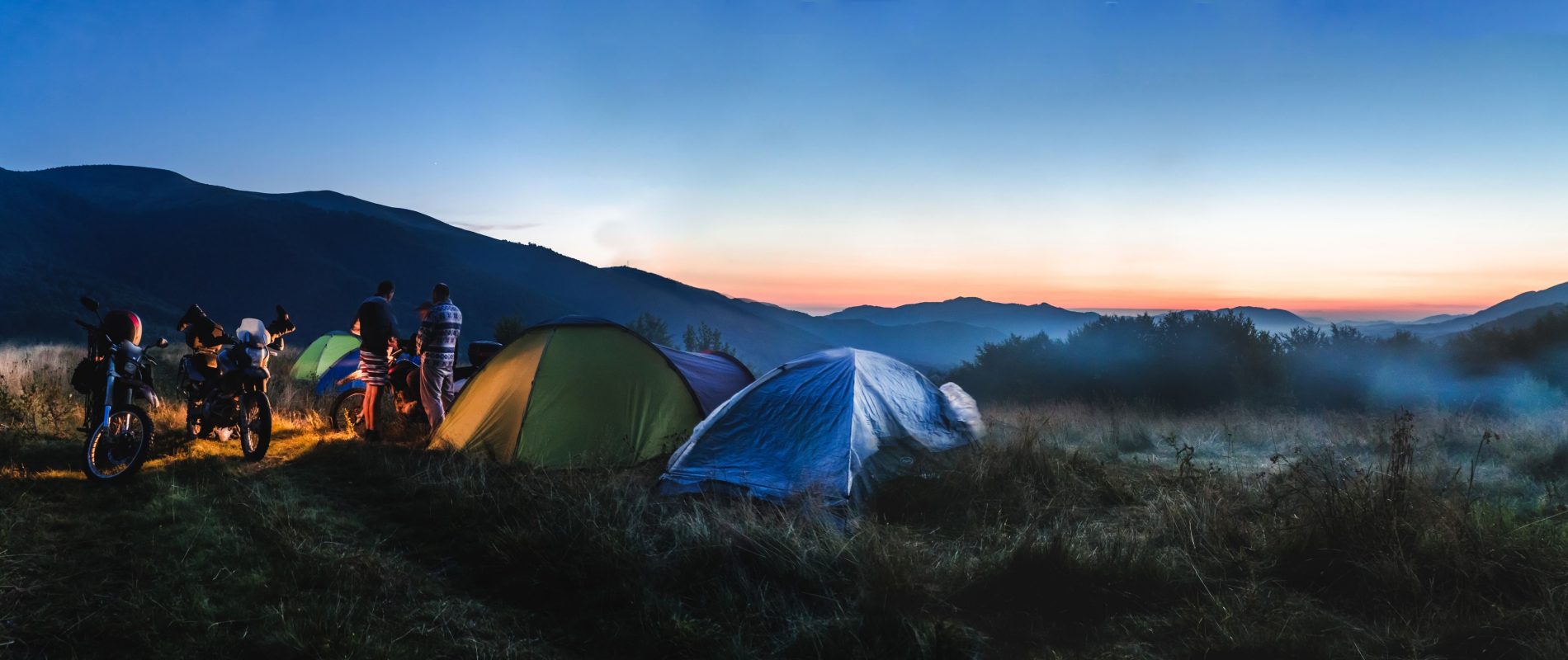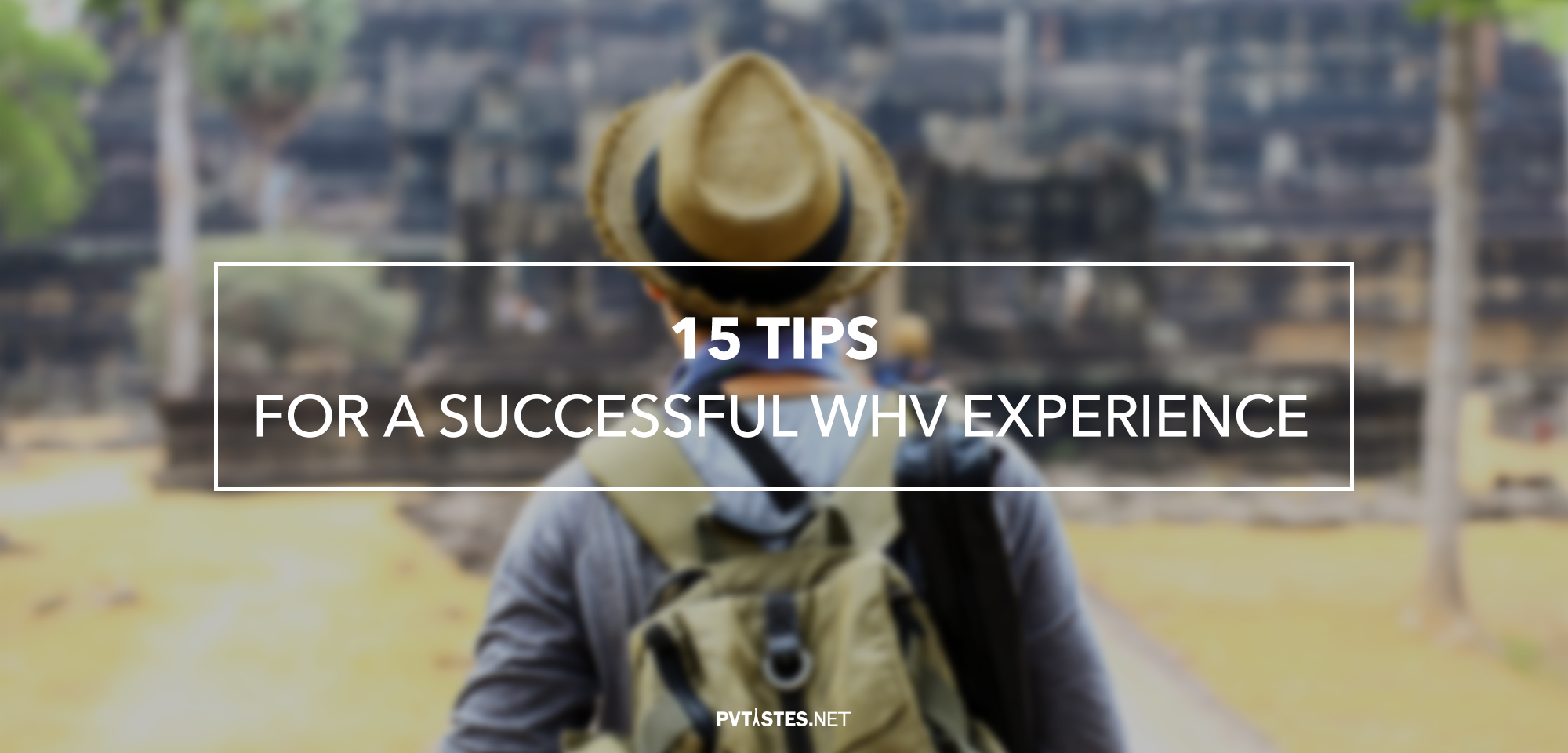In a previous article, we gave you 16 good reasons—as if just one wasn’t good enough!—to apply for a working holiday visa (WHV). Now, we’re going to share valuable tips to set you on the right path. Indeed, even though a WHV experience is an unforgettable journey full of magical moments for the most parts, there are still some traps to avoid!
1. Money—You Need to Bring Some
Every destination advises WHV holders to leave home with some savings. The recommended amount is around €2,500, but a few countries with a higher cost of living require a higher balance as proof of funds—AU$5,000 for Australia and €3,100 for Japan. Having money in your savings account is really important. You’ll need funds for your first few weeks, especially if you don’t find a job right away.
So, how much is enough? The best way to do the math is to calculate the initial amount you’ll need based on your WHV plans.
Scenario 1: You plan to land in Australia, stay in Sydney for seven days then volunteer for several weeks through WWOOF or HelpX. At the beginning of your stay, expenses are minimal, therefore leaving with the recommended AU$5,000 is doable.
Scenario 2: You plan to fly to New Zealand and buy a second-hand camper van to travel around for three months. In this case, the required amount of NZ$4,200 won’t cover your expenses. Camper vans are expensive, especially if you make the purchase alone. Besides, you’ll have to support yourself for three months (food, activities, gear, etc.) and pay for gas, vehicle insurance and deal with potential mechanical problems. So take these NZ$4,200 and double the amount.
To find the required proof of funds for each destination, check out our Destination page.
2. Opportunities are everywhere but “the beach” doesn’t exist
Travel shows, friends’ social media accounts and a wild imagination make us believe XYZ destination is a complete paradise. However, many WHV holders are in for a rude awakening after a few weeks abroad. No country can boast a 0% unemployment rate, you won’t always be welcomed with open arms and some fields hire more than others, depending of the country.
Other factors related to your age or WHV status can be very challenging at first: limited proficiency in the official language, lack of professional experience in your field, lack of relevant experience (if you’re looking for odd jobs) or simply lack of job-hunting experience.
Know the possible issues and create strategies to deal with them. Otherwise, the WHV experience can quickly become a frustrating journey. You can expect required funds to be enough to roughly cover 2 to 3 months of living expenses at destination, depending on your lifestyle and exact location—big cities like Tokyo, Sydney or Toronto are more expensive than small towns. Note that the cost of living can vary greatly within a country, so do research beforehand!
3. Learn About Your Destination Before You Land
We offer tons of articles on how to prepare before embarking on a WHV adventure. We also have focused articles where you can learn the ins and outs of most WHV destinations. Yet, despite all the info available online, we often hear and read the same questions at travel fairs, WHV meetups or on the website’s forum and social media channels:
- Can I buy a one-way plane ticket if I have a WHV?
- Are all WHV issued through a lottery system? (Nope, only those for Canada.)
- How do I find accommodation? How difficult is it?
- “Practical Info” section includes 1) themed content 2) most recent articles.
- Free available-to-download WHV guide for a comprehensive overview of Canada.
- Mobile app pvtistes.
4. Purchase a WHV Insurance Policy For the Duration of Your Stay
It can’t be stressed enough: do buy a comprehensive insurance policy for the entire duration of your stay. It should provide coverage for medical emergencies in case of sickness (i.e. flu, tonsillitis, etc.), accidents (including hospital stay) and emergency evacuation expenses, unfortunate yet common enough events that can cost tens of thousands of euros. Insurance coverage is mandatory for most WHV destinations and a proof of insurance is usually required in the application or upon arrival. However, for a few places like Australia, it’s only “highly recommended.”
“Before you leave, you’re probably wondering what’s the point of buying insurance . I mean, we are young and healthy, right? […] Just to be on the safe side, though, I bought insurance coverage. Well, I’m glad I did. Over the course of nine months in New Zealand, I went to the hospital after falling off my bike (€170), then I had to see a doctor (€100). I was hospitalized for about ten days for an illness (€15,000) then I had to be repatriated to France for medical reasons (€XXXXX). I know I’m probably an exception, but as you can see, these kinds of emergencies can happen to anyone! That’s when a good insurance policy comes in handy!”
—Clément, WHV holder in New Zealand
For less than €400, you can purchase a one-year travel insurance policy covering emergencies. This is a cheap price to pay for peace of mind!
Note that some insurance companies will refund the remaining months on your policy if you go home earlier than planned. For example, if you buy insurance coverage for 12 months and go home mid-year, the six remaining months will be refunded. Contact insurance companies for complete terms and conditions. Sometimes, you can only get a refund if you didn’t make a claim during your stay. Globe PVT requires at least two full months left before the end of the contract to qualify for a refund.
5. Be Aware of Upcoming Challenges If You Don’t Speak the National Language
This is especially true in very popular WHV destinations. Going to South Korea, Hong Kong, Taiwan or Japan without speaking the language is a challenge but on the plus side, there won’t be much competition. It’s a different story in the South Pacific where New Zealand welcomes nearly 60,000 WHV holders every year, while Australia hosts about 220,000 WHV holders from 39 other countries in total, including Irish, English, Swedish citizens who speak English better than most French/Spanish speaking (for instance) WHV holders.
It’s okay to pick a destination where your vocabulary is limited, it’s even a great way to learn the language. However, take note that:
- You’ll be competing with candidates fluent in the language for the same job.
- Meaningful conversation and jokes may be lost in translation and making friends with non-English speakers could be difficult.
Up for this difficult yet rewarding challenge? Consider taking language classes when you arrive or volunteering through WWOOF, HelpX or Workaway, a popular option in Australia, New Zealand and South America. You can also sign up to be an au pair, an excellent opportunity to improve your language skills, keep expenses under control and enjoy a stipend.
The key is to go out and meet people. Join a sports team, sign up for an activity or go to your local Meetup group. You can also participate in conversation exchanges with native speakers where you trade 30 minutes of conversation in your language for 30 minutes in a foreign language—it benefits both parties and yes, you’ll learn slang. Whatever you choose, don’t stay alone, don’t focus too much on grammatical mistakes and don’t be self-conscious of your accent as long as you communicate on a daily basis.
6. Investigate the Local Job Market
This is especially true for those interested in working in a specific field. If you are willing to take any job opportunity, there are still challenges but the market is bigger.
However, if you’re aiming for a particular industry, research the current local job market to avoid disappointments.
Are there any job openings in this field? How many? How often? How long does it take for employers to fill in open positions? What are the skills required? Do you have these skills? Is your degree recognized in your destination? Is additional training required? Is your profession regulated? Do you have enough experience? Can you speak the local language well enough? A cook and a stone cutter can be hired with an intermediate language level whereas a chief communications officer, a hotel receptionist or a lawyer will need to be fluent in the local language.
Moreover, while some WHV destinations don’t have any restrictions in terms of employment, other countries have some red tape in place:
Australia: work up to 6 months for the same employer (exceptions).
Hong Kong: work up to 3, 6 or 12 months for the same employer, depending on your citizenship.
New Zealand: no permanent position but an employer can offer a 12-month contract.
Japan: no seeking employment where the “Law on Control and Improvement of Amusement and Entertainment Business” applies (nightclubs, bars…).
South Korea: work a maximum of 25 hours per week. In addition, you cannot work in the following industries: entertainment, law, medicine, aviation, journalism or engineering. You can’t teach either.
7. Use Your WHV Before It Expires!
Each country signed a different bilateral agreement, so terms and conditions depend on your citizenship and destination. Age limits (29 to 35 years old), visa quotas and application processes (in person or online) do vary.
There are two important points to keep in mind:
From the day the visa is issued, you have to use it within a certain period of time. For example, Australia and New Zealand grant you 12 months to activate it, so you can land 11 months after the visa was issued. Once you set foot in the country, your 12-month visa starts. This timeframe is shorter for Hong Kong and Argentina, two countries where you must land within 3 months of your visa being issued.
If you do not enter the country within the allotted time period, your WHV visa is cancelled. You won’t be able to reapply for a WHV for the same destination even if you notify authorities that you will miss your landing deadline, even if you have very good personal reasons to land later than planned. There is one exception: Australia, a destination where you can reapply for a WHV if you didn’t use yours, as long as you pay the fees again. However, since there is no quota for Australian WHV, only start the application process when your plans to explore Down Under are definitive.
8. Bring Along Important, Required Documents
Some documents, including proof of savings and a copy of your insurance policy, are sometimes required during the visa application process.
These documents can also be requested upon arrival from immigration services. Australia and New Zealand rarely ask for them but Canada frequently does. No matter what your destination is, you should have a copy of the proof of funds (a bank statement, for instance) and the original insurance policy.
Before you leave, remember to scan important documents you may need (e.g. diplomas, letters of recommendation, certification, etc.) and apply for documents you may need, such as an international driver’s licence.
9. Don’t Rely Too Much on Other WHV Holders’ Experiences
“A friend of mine loved her WHV experience. She landed a job an hour after she unpacked her bags.”
“My buddy just came back—what an awful experience, he couldn’t find a job, he ran out of money and he had to take the next plane home after a month.”
Of course, both of these examples are exaggerated but they show that for some people, life is easy and for other, a challenge can turn the experience into a complete disaster.
Don’t rely too much on hearsay. Your experience will probably be “normal,” i.e. a mix of adventure, fun and yes, challenges too. People just deal with issues differently.
Think about these “lucky travellers.” Are they fluent in the country’s language? Did they have contacts at destination before arriving? Are they particularly resourceful? Incredibly sociable? Did they grab every opportunity? How much money did they need to live comfortably? How much did they save before the trip? Were they just lucky?
And now think of the poor souls who had a miserable time. Did they speak the language? Are they shy, quiet and withdrawn? Are they confident? Did they drop off their resume in person or did they just look at classifieds online? What kind of work experience did they have on their resume? Was it just bad luck?
A WHV holder in Japan once told me this story: “When I first arrived, I met a woman at the hostel. She spoke four languages, including Japanese, and she had been looking for a job for two months without luck. ‘If she can’t be hired with her skills, there is no way I’m getting a job!’ I thought. Ten days later, I had two job offers—one as an English teacher and one as a waitress. I even had to turn down a position as a French teacher.”
Of course, it’s fascinating to learn from other people’s mistakes and get good tips on forums. But each experience is unique because we all have a different personality, meet different people, make different decisions. Bottom line is, there is no absolute truth.
10. Focus on Positive Feedback
One of the longest threads on the forum is the one that started with this question: How did your family and friends react when you told them about your WHV project?
Some are happy for you because they think it’s a great project, an opportunity to grab. But other relatives may question your plans: “What are you going to do there?” “Do you really think you can get a job?” “You don’t even speak a word of the language!” “How are you going to explain that gap in your resume once you’re back?”
Block out negative comments. Listen to people who support you and help you focus on the benefits of an experience abroad. Going on an adventure, meeting locals and fellow travellers, gaining work experiences—the WHV opens the way to an amazing year of discoveries. And you can avoid or overcome roadblocks if you expect them and come prepared with a positive attitude!
Younger travellers, especially those who’ve just turned 18 or 19, can have a hard time convincing their parents they are ready to spread their wings. Put yourself in their shoes—it’s hard for them to picture you thousands of kilometres away, in Japan, Australia or Argentina for an entire year.
Try to show your loved ones you have a sound project and you take planning seriously. Set a budget, save money, compare insurance policies, read testimonies of current and past WHV holders and expect a one- or two-month-long job hunt. Tell them you won’t give up and will grasp opportunities.
Finally, invite them to come visit a couple of months after you land—they may find the idea both exciting and comforting since they will be able to see your new environment with their own eyes and share a bit of your experience.
11. Come Out of Your Shell
Are you shy? Do you find the concept of small talk terrifying? Do you find it impossible to picture yourself sharing a ride with three travellers you’ve just met? Are your language skills abysmal? Put yourself out there and start right now!
My trick in Australia was to imagine the worst-case scenario. Most of the time, it was being told “no,” stumbling upon a rude mate or losing a bus ticket—no big deal, right?
An employer can reject your application but you can also be called back for an interview. The cute French woman may find your accent sexy. Take chances and try something new! If it doesn’t work out, smile and chalk it up to experience.
12. Don’t Give Up Too Quickly
From time to time, we read stories of WHV holders who had planned to stay for a year but who head back home after a couple of weeks or a couple of months.
Why are some trips cut short? These are the two most common reasons:
Running out of money. Custom officers don’t always check how much savings you have upon arrival and some traveller take chances. A few of you arrive on a tight budget (i.e. €1,000). If you don’t have local contacts and if you aren’t extremely resourceful and proactive, you won’t make it.
Feeling disappointed and possibly overwhelmed. Sometimes, the destination isn’t as great as you thought it’d be or sometimes the adjustment is just too difficult (frustrating job hunt, loneliness, etc.).
If you’re running out of money, don’t wait until your balance is negative. Volunteering is a great option to get back on your feet and it’s also a networking opportunity that may lead to future job prospects.
If you’re down on your luck, don’t give up! Novelty can be frightening. It takes time, willingness and patience to adapt to a new environment, understand local customs and adopt a new way of life.
Not all cities have the same atmosphere—feel free to move around until you find your spot!
Maybe you haven’t met the right people yet. Join a club or an activity (sports, dance, music, volunteer work, etc.) to see as many faces as you can. Two or three good friends can turn a strange place into a magical city.
If you have trouble finding work, be patient! Keep on applying and it’ll pay off. When I was in Canada as a twenty-year-old WHV holder, I went through a rough time for a couple of months. But I started networking and I landed a job, and subsequent job searches were much easier afterwards with contacts and references.
This is your project and you care about it. Give it a chance and appreciate what a difference a day (or a month!) makes, especially if you’re proactive and open to opportunities. And don’t forget to reconsider your expectation as well: at first, it’s probably best to follow up on every lead, you can’t afford to be too picky yet.
Finally, if you really don’t feel well and hate the destination, be proud of the experience you had and head home. We strongly believe that going home sooner than expected isn’t failing—regrets if you don’t follow your dreams is worst.
13. Consider Volunteering Options
Volunteering at the beginning of your stay can be a great idea:
- It’s instant cultural immersion as you interact with locals
- You can quickly improve your language skills
- It’s a way to lower living expenses and gain professional experience
Volunteering means trading four to six hours of work a day for meals and accommodation. WWOOF, HelpX and Workaway are the three most famous organizations. For more information about HelpX and for tips on volunteering, check out our “HelpX on a WHV” section.
Even if volunteering wasn’t in your plans, reconsider the option if your initial WHV experience is more difficult than planned. This could be a solution to the most common issues—spending too much, having troubles landing a job, experiencing issues interacting with locals on a daily basis. Indeed, it’s a good way to connect with foreigners and locals alike, spend less and do something different in your life.
14. Try to Mingle With Non-Anglophones
You probably don’t want to avoid people who speak your language because, well, they are also great people who can be travel buddies, roommates or precious sources of information.
However, some WHV don’t pick up any other language—Spanish, Chinese, Korean, etc.—along the way and miss out on an amazing linguistic opportunity because they speak English all the time.
Here are a few tips to improve your language skills:
- Make sure you don’t only hang out with English-speaking people in all aspects of your life (work, leisure, etc.). Speak a foreign language on a daily basis with a roommate, a coworker or a friend.
- Always try to include locals in all social gatherings—out of respect, you shouldn’t speak English if someone in the group doesn’t understand the language!
- Go out, meet new people and don’t focus too much on your grammar or accent. After a beer or two, when you’re relaxed, you’ll speak more fluently and you’ll understand the language as well. No, beer isn’t the magic ingredient—being relaxed, in a friendly atmosphere is (so it also works with coffee or a good meal!). Putting too much pressure on yourself is counterproductive. Just speak! If your interlocutor understands you, it’s all good. You have a year to improve your grammar and accent. Don’t be too hard on yourself at first.
15. Have a safe WHV experience!
A gap year is a very freeing experience. Yet, it’s important to be careful and stay safe. Respect others and take care of yourself.
- Trust your gut instincts when hitchhiking. If someone seems unreliable or makes you feel uneasy, don’t climb in the passenger seat.
- If you’re planning a long drive, take enough water and gas. This is especially true for Australia where you must fill up every time you find a station in the Outback (the next one is probably hundreds of kilometres away!).
- Once in a while, you’ll hear the story of the guy who got lost in the Australian Outback. Follow the local advice: tell people you’re heading to a remote place and let them know how long you’ll be unreachable. This way, they’ll know when to seek help if they don’t hear from you.
- Australia, New Zealand, Hong Kong and Japan drive on the left side of the road. An accident can happen fast if you forget this basic fact early in the morning or late at night after a long day at work.
- Beware of scams!
- Behave. First, out of respect for others, especially the locals, and out of fellow travellers because you don’t want to give backpackers a bad name. Besides, you don’t want to finding yourself in a sticky situation thousands of kilometres away from home.
Have an awesome WHV experience!
Interesting links:
- 16 Good Reasons to Apply for a Working Holiday Visa
- The Working Holiday Visa Adventure as a Solo Traveller
- Step-By-Step Guide to International Experience Canada Work Permits — International Co-op, Young Professionals and Working Holiday Applications
- Applying for a Working Holiday Visa (Subclass 417) To Australia: The Ultimate Step-By-Step Guide with Screenshots
- Globe WHV insurance policy highlights
- 15 Tips for a Successful WHV Experience
- Tips to avoid being forced (or tempted) to cut your WHV adventure short

















 Français
Français English
English




0 comments
{{like.username}}
Loading...
Load more